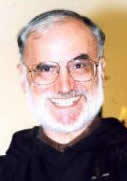One day Jesus was on
his way to a solitary place along the shore of the
Sea of Galilee.
The Gospel of Matthew tells the story: “But when he
disembarked he found that a large crowd was waiting
for him. When he disembarked and saw the vast crowd,
his heart was moved with pity for them, and he cured
their sick.
"When it was evening, the disciples approached him
and said, ‘This is a deserted place and it is
already late; dismiss the crowds so that they can go
to the villages and buy food for themselves.’
"Jesus said to them, ‘There is no need for them to
go away; give them some food yourselves.’ But they
said to him, ‘Five loaves and two fish are all we
have here.’
"Then he said, ‘Bring them here to me,’ and he
ordered the crowds to sit down on the grass. Taking
the five loaves and the two fish, and looking up to
heaven, he said the blessing, broke the loaves, and
gave them to the disciples, who in turn gave them to
the crowds.
"They all ate and were satisfied, and they picked up
the fragments left over -- twelve wicker baskets
full. Those who ate were about five thousand men,
not counting women and children.”
It was the most joyous picnic in the history of the
world!
What does this Gospel tell us? First, that Jesus was
worried and “his heart was moved with pity” for the
whole man, body and soul. He distributes the word to
the soul, and to the body he offers healing and
food. You will say: So why doesn’t he still do that
today? Why doesn’t he multiply bread for the many
millions who are starving on the earth?
There is a detail in this Gospel that can help us to
find the answer to these questions. Jesus does not
snap his fingers and bread and fish appear magically
at will. He asked his disciples what they had; he
invited them to share what they had: five loaves of
bread and two fish.
Jesus does the same today. He asks us to share the
resources of the earth. It is well known, at least
in regard to food, that our earth would be able to
support more than a billion more people than
presently inhabit the earth.
So how can we accuse God of not furnishing enough
bread for everyone when every year we destroy
millions of tons of food supplies -- which we say we
have “too much” of -- so as to prevent food prices
from falling? What is the solution? Better
distribution, greater solidarity and more sharing.
I know, it’s not that easy. There is the mania for
weapons, there are irresponsible government leaders
who keep many people hungry. But part of the
responsibility is on the shoulders of the rich
countries. We are that anonymous person -- a boy,
according to one of the evangelists -- who has five
loaves of bread and two fish; it is only that we
hold onto them and are careful with them lest they
be shared with everyone.
Because of the way in which it is described --
“Taking the five loaves and the two fish, and
looking up to heaven, he said the blessing, broke
the loaves, and gave them to the disciples" -- the
multiplication of the loaves and fish has always
made us think of the multiplication of that other
bread, which is the body of Christ.
For this reason the most antique representations of
the Eucharist are of a basket containing loaves of
bread and, on the sides, two fish, like the mosaic
discovered in Tabga in Palestine, in the church
erected on the site of the multiplication of the
loaves, or in the famous fresco in the catacombs of
Priscilla.
At bottom, even that which we are doing in this
moment with this commentary is a multiplication of
loaves -- the loaves of bread of the word of God. I
have broken open the bread of the word and the
Internet has multiplied my words -- but many more
than 5,000 men, even this time, have eaten and are
satisfied.
There remains this task: “picking up the fragments
left over,” and bringing them also to those who did
not participate in the banquet. We must be
“repeaters” and witnesses of the message.

